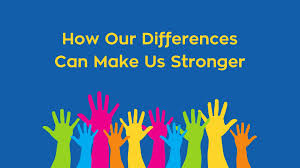
The Beauty in Differences
Our world is a tapestry woven with threads of diversity, each strand representing a unique individual with their own story, experiences, and perspectives. Differences are what make us human, what give colour to our existence, and what enrich our lives in countless ways.
Embracing Diversity
Embracing diversity means celebrating the myriad of differences that exist among us – differences in culture, beliefs, traditions, and identities. It is about recognising that each person brings something valuable to the table, something that adds to the richness of our collective experience.
Understanding Uniqueness
Understanding uniqueness involves acknowledging that no two individuals are exactly alike. We all have our own strengths, weaknesses, talents, and challenges. By understanding and appreciating these differences, we can foster a more inclusive and compassionate society where everyone feels valued and respected.
Benefits of Differences
The benefits of embracing differences are manifold. They allow us to learn from one another, broaden our perspectives, and challenge our preconceived notions. Differences spark creativity, innovation, and growth – they push us to think outside the box and see the world through new eyes.
Conclusion
In a world that often seeks to homogenise and standardise, it is important to remember the beauty in our differences. Let us celebrate diversity, embrace uniqueness, and strive to build a more inclusive society where every individual is valued for who they are.
Understanding and Clarifying Differences: Commonly Asked Questions
- What do you understand by differences?
- What do you mean differences?
- How do you say differences?
- What is the meaning of differences?
- What is an example of a difference?
- What is the synonym for deference?
- What is a synonym for showing the differences?
What do you understand by differences?
Understanding differences involves recognising and appreciating the unique variations that exist among individuals, groups, or things. Differences can manifest in various forms, such as cultural backgrounds, beliefs, experiences, perspectives, abilities, and preferences. Embracing these diversities allows us to cultivate empathy, broaden our understanding of the world, and foster a more inclusive and harmonious society where each person’s distinctiveness is valued and respected.
What do you mean differences?
“Differences refer to the variations and distinctions that exist among individuals, groups, or things. These disparities can manifest in various forms such as cultural backgrounds, beliefs, opinions, behaviours, or physical characteristics. Embracing differences entails acknowledging and respecting these diverse qualities, understanding that they contribute to the rich tapestry of humanity. By recognising and valuing our dissimilarities, we can foster a more inclusive and harmonious society where each unique perspective is appreciated.”
How do you say differences?
The concept of ‘differences’ can be expressed in various ways, depending on the context and the specific nuances one wishes to convey. Synonyms for ‘differences’ include variances, distinctions, disparities, divergences, or contrasts. Each of these terms carries its own subtle shades of meaning, highlighting the unique aspects that set things apart from each other. The choice of how to articulate ‘differences’ ultimately depends on the specific emphasis one aims to place on the varying aspects being compared or contrasted.
What is the meaning of differences?
The concept of differences encompasses the variations, distinctions, and disparities that exist between individuals, groups, or things. Differences can manifest in various forms, such as in beliefs, perspectives, experiences, abilities, cultures, and more. Understanding the meaning of differences involves recognising and appreciating the unique qualities that make each entity distinct from one another. Embracing these diversities not only enriches our interactions and relationships but also fosters a more inclusive and tolerant society where every individual’s uniqueness is valued.
What is an example of a difference?
An example of a difference can be seen in the contrasting personalities of two siblings within the same family. While one sibling may be outgoing and sociable, the other may be introverted and reserved. This variance in temperament showcases how individuals can possess unique characteristics and behaviours, even when sharing similar backgrounds and environments. Such differences highlight the diversity that exists among people and emphasise the richness that comes from embracing and understanding these individual distinctions.
What is the synonym for deference?
A common synonym for deference is “respect.” Deference and respect both imply a deep admiration or regard for someone’s authority, opinions, or feelings. Showing deference towards someone means acknowledging their status or expertise and treating them with the respect they deserve. In essence, deference and respect go hand in hand, highlighting the importance of honouring and valuing others in various social and professional contexts.
What is a synonym for showing the differences?
A common synonym for showing the differences is “contrasting.” When we contrast two or more things, we highlight their differences, allowing us to better understand and appreciate the unique characteristics of each. By contrasting elements, whether they be ideas, objects, or individuals, we can gain a clearer insight into the distinctions that set them apart from one another.
